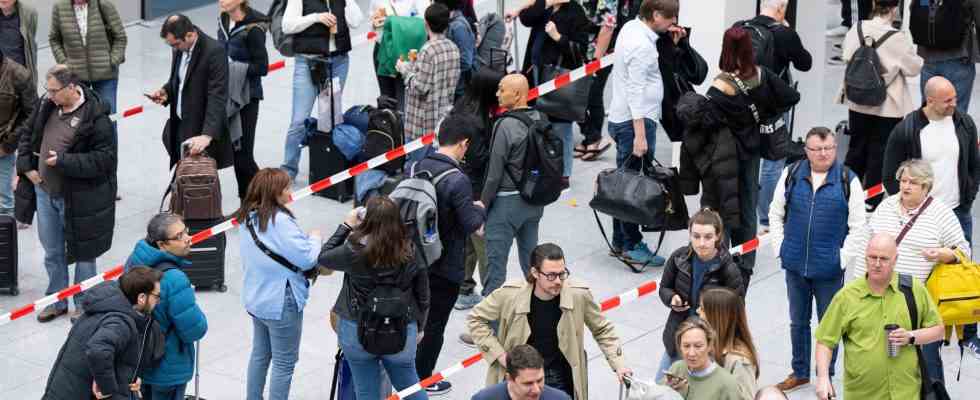Status: 03/26/2023 09:21 a.m
No trains, no flights, no buses – with their major strike on Monday, ver.di and EVG want to build up pressure. Mayor Welge thinks that’s “completely exaggerated” – and accuses the unions of having a bad negotiating tone.
Germany is largely at a standstill on Monday: the announced warning strikes will result in restrictions on the road, rail, water and air traffic. In view of the massive effects, the municipalities accuse the two unions ver.di and the railway union EVG of excessive exaggeration.
“The right to strike is being exhausted in an inflationary manner,” said the municipal negotiator, Karin Welge. The VKA President pointed out that a result should finally be achieved in the third round. The escalation of the unions makes them “a bit angry,” said Welge, who is also the mayor of Gelsenkirchen. “That’s not the negotiating tone that we use.”
Welge: Citizens “can no longer recognize this as a warning strike”
Welge criticized the fact that the unions organize the walkouts of different collective bargaining rounds at the same time – above all in the railway and in the public sector. “Citizens are no longer able to perceive this as a warning strike,” said the VKA President. “In the end, no one can understand which round of collective bargaining is the reason for the strike.”
Welge also accused the unions of acting as if there could be no compromise at the negotiating table. The corridor now has to be explored where people are still at odds. “I believe in our community of responsibility and call on unions to take their responsibilities seriously,” she said.
Warning strike started at Munich Airport
While the large-scale warning strike will be particularly noticeable on Monday, Munich Airport has been standing still since the morning. Regular operations are suspended up to and including Monday.
According to the airport company, a total of around 1,500 flight connections are affected. Take-offs and landings are therefore only possible for humanitarian flights in emergency operations. Passengers who have planned a flight to or from Munich for today or tomorrow should contact their airline. The airport expressly advises against driving to the airport despite the warning strike.
Airport boss Jost Lammers also criticized the work stoppage announced by ver.di. It represents an “unprecedented escalation and is excessive and completely disproportionate,” said Lammers. The Munich hub with international and intercontinental connections will be practically shut down. This causes immense economic damage.
A total of 200,000 passengers will be affected on the two days of the strike at Munich Airport. On Monday there will also be a strike at Nuremberg Airport.
No train strikes over Easter
Meanwhile, the all-clear is given with a view to train connections at Easter. “Since we want to hit employers and not travelers with strikes, we will not negotiate around the Easter holidays,” EVG told “Bild am Sonntag”. Strikes around the holidays could be ruled out for all travellers.
Ver.di boss Frank Werneke advised citizens to cycle to work on Monday or to walk. A strike is only effective if it sends out an unmistakable signal. “Despite all the barrage against us, we have had 70,000 new members since the beginning of the year. This is the strongest increase in membership since our founding more than 20 years ago,” said Werneke. While strikes were not used to recruit new members, many who were entering industrial action for the first time would then join.
Negotiations for more than two million workers
The 24-hour warning strike is scheduled to begin at 00:00 on Monday and last throughout the day. Both the train and bus traffic as well as airports are to be largely paralyzed nationwide. The strike also affects shipping and motorways as well as local public transport in several federal states.
Both unions are thus increasing the pressure on the collective bargaining that has so far been unsuccessful. Ver.di negotiates for the approximately 2.5 million employees in the public sector at federal and local level, including those working in local transport and at airports. The union demands 10.5 percent more, but at least 500 euros per month.
The EVG is negotiating for around 230,000 employees at 50 train and bus companies, for whom they want twelve percent more wages, but at least 650 euros more per month.

